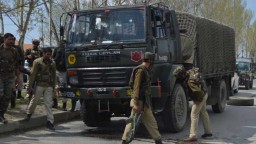Latest News
INDIA’S ROLE AND PERSPECTIVE

The war in Ukraine and US-China tensions pose the most significant risks to the global economy and political stability in 2023 and beyond. Russia’s invasion of Ukraine has rapidly inflated energy and food prices, leading to cost issues for businesses and soaring living costs for consumers in 2022 and amid all this the world is getting divided on lines of cold war era once again with US and West on one side and Russia - China axis on the other. Improving economy and growing international stature can put India in driver’s seat and its multialignment approach to geopolitics is likely be validated in 2023. India is today in the midst of a major geopolitical repositioning, trying to pursue a national interests-based policy whereby continuing good relations with its most dependable ally Russia and at the same time build stronger strategic ties the United States and its allies in the region, especially Japan.
GEO- POLITICAL SCENARIO AND MAJOR CHALLENGES - 2023
Russia-Ukraine war. A yearlong Russia-Ukraine war has impacted the world’s food and energy security, and is pushing the global economy towards a recession. The nuclear rhetoric from Russian leaders has caused global anxiety. Another major concern is triggering of arms race and revival of cold war era. The war has rapidly inflated energy and food prices, leading to cost issues for businesses and soaring living costs for consumers in 2022. With de-escalation unlikely in near future the situation is going to be more explosive resulting in political turmoil.
Chinese Aggressive Posture The past one year has witnessed a visibly aggressive Chinese posture in the Indo-Pacific, wherein Chinese clashed with Indian troops on Sino Indian border (Galwan and Tawang) and controversial construction of bases in Islands in South China Sea. Apart from this China’s potential invasion of Taiwan remains a burning issue that keeps the two largest economies, the US and China at loggerheads and both are continuously engaged in diminishing each other’s political and economic influence over the other countries. A possible fallout of this may be reorientation of supply chain management and restructuring of the global economy which may further widen the political and economic divide.
Resurgence of Taliban in Afghanistan. The new Taliban regime in Afghanistan post US withdrawal remains a major challenge for peace and stability in the region. The influence and control of Pakistan and its Army over Taliban still remains a point of speculation and consideration. India reopened its operations in the Indian embassy in Kabul and began the process of re-engaging by sending humanitarian aid in the form of food grains, vaccines, and essential medicines. While signalling a long-term commitment to development of Afghanistan, India has to draw redlines on the Menace of Extremism and Rights of Minorities and Women.
Indo - Pak Relationship. Since February 2021, the borders with Pakistan have been remarkably quiet with a notable reduction in cross-border firings. However, the cease-fire has not led to normalisation or a thaw in other areas of the India-Pakistan relationship. Both the countries continue to rake up issues for domestic consumption and the status quo is likely to continue new civilian government and top Army hierarchy change their stance after the general elections are held this year.
INDIA’S ROLE AND PERSPECTIVE
India’s strategy to have enhanced cooperation with the US and allies (the QUAD) to make Indo Pacific secure and peaceful and countering Chinese influence will have to be consolidated further and at the same time India will have to work out its strategic response to stand up to the bully with firmness. More clashes and competing interests with India are likely, which will have to be resolved through enhancing trade and commerce leverage and use Russian influence during mutual negotiations.
India’s continued friendship and cooperation with Russia despite the US and the west blaming Russia for Ukraine war and India buying oil from Russia in spite of economic sanctions has irked them. India’s presidency of the Shanghai Cooperation Organisation (SCO) has picked up momentum with an eye to balance China’s inroads across Eurasia.
Playing host to world leaders at the G-20 summit in September will validate India’s rising importance and brokering substantive consensus on pressing global concerns will certainly demonstrate its international influence. India is determined to steer the forum clear of divisive geopolitical issues like the RussiaUkraine war and instead concentrate on more inclusive manner on the collective concerns of climate change.
India has proven resilient, managing the pandemic, internal protests, climate-induced disasters and economic shocks and emerged as growing nation with potential economy. The continued path of economic growth, improved infrastructure, seeking more FDI, reliance on hi tech growth, self-sufficiency in energy and defence sectors and a clean, stable political environment are few domestic agendas that will pave way for facing the new geo political challenges in future.
THE VIEWS EXPRESSED BY THE AUTHOR ARE PERSONAL
COL RAJESH BHUKAR The author is a Post Graduate in International Studies, Alumni of Defense Services Staff College, Wellington and College of Combat, Mhow [email protected]











.png)

.png)
.png)
.png)
.jpg)
.png)

.png)

